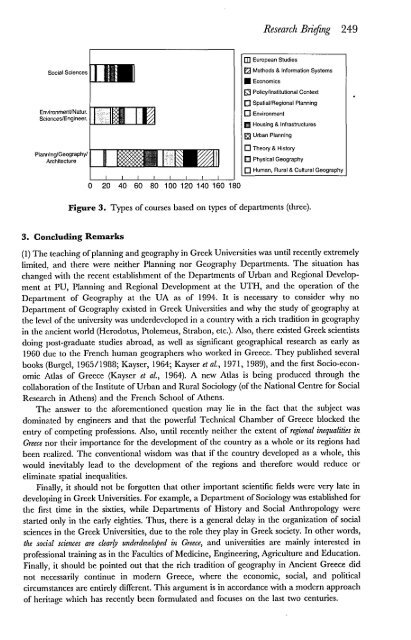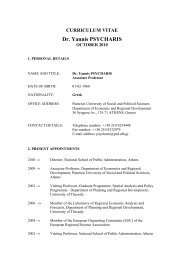The development of planning education and its relation to the ...
The development of planning education and its relation to the ...
The development of planning education and its relation to the ...
You also want an ePaper? Increase the reach of your titles
YUMPU automatically turns print PDFs into web optimized ePapers that Google loves.
Research Briefing 249<br />
Social Sciences<br />
Environment/Natur.<br />
Sciences/Engineer.<br />
Planning/Geography/<br />
Architecture<br />
n European Studies<br />
Q Methods & Information Systems<br />
• Economics<br />
0 Policy/Institutional Context<br />
• Spatial/Regional Planning<br />
D Environment<br />
^ Housing & Infrastructures<br />
^ Urban Planning<br />
• <strong>The</strong>ory & His<strong>to</strong>ry<br />
• Physical Geography<br />
£] Human, Rural & Cultural Geography<br />
0 20 40 60 80 100 120 140 160 180<br />
Figure 3. Types <strong>of</strong> courses based on types <strong>of</strong> departments (three).<br />
3. Concluding Remarks<br />
(1) <strong>The</strong> teaching <strong>of</strong> <strong>planning</strong> <strong>and</strong> geography in Greek Universities was until recently extremely<br />
limited, <strong>and</strong> <strong>the</strong>re were nei<strong>the</strong>r Planning nor Geography Departments. <strong>The</strong> situation has<br />
changed with <strong>the</strong> recent establishment <strong>of</strong> <strong>the</strong> Departments <strong>of</strong> Urban <strong>and</strong> Regional Development<br />
at PU, Planning <strong>and</strong> Regional Development at <strong>the</strong> UTH, <strong>and</strong> <strong>the</strong> operation <strong>of</strong> <strong>the</strong><br />
Department <strong>of</strong> Geography at <strong>the</strong> UA as <strong>of</strong> 1994. It is necessary <strong>to</strong> consider why no<br />
Department <strong>of</strong> Geography existed in Greek Universities <strong>and</strong> why <strong>the</strong> study <strong>of</strong> geography at<br />
<strong>the</strong> level <strong>of</strong> <strong>the</strong> university was underdeveloped in a country with a rich tradition in geography<br />
in <strong>the</strong> ancient world (Herodotus, P<strong>to</strong>lemeus, Strabon, etc.). Also, <strong>the</strong>re existed Greek scientists<br />
doing post-graduate studies abroad, as well as significant geographical research as early as<br />
1960 due <strong>to</strong> <strong>the</strong> French human geographers who worked in Greece. <strong>The</strong>y published several<br />
books (Burgel, 1965/1988; Kayser, 1964; Kayser et al, 1971, 1989), <strong>and</strong> <strong>the</strong> first Socio-economic<br />
Atlas <strong>of</strong> Greece (Kayser et al, 1964). A new Atlas is being produced through <strong>the</strong><br />
collaboration <strong>of</strong> <strong>the</strong> Institute <strong>of</strong> Urban <strong>and</strong> Rural Sociology (<strong>of</strong> <strong>the</strong> National Centre for Social<br />
Research in A<strong>the</strong>ns) <strong>and</strong> <strong>the</strong> French School <strong>of</strong> A<strong>the</strong>ns.<br />
<strong>The</strong> answer <strong>to</strong> <strong>the</strong> aforementioned question may lie in <strong>the</strong> fact that <strong>the</strong> subject was<br />
dominated by engineers <strong>and</strong> that <strong>the</strong> powerful Technical Chamber <strong>of</strong> Greece blocked <strong>the</strong><br />
entry <strong>of</strong> competing pr<strong>of</strong>essions. Also, until recently nei<strong>the</strong>r <strong>the</strong> extent <strong>of</strong> regional inequalities in<br />
Greece nor <strong>the</strong>ir importance for <strong>the</strong> <strong>development</strong> <strong>of</strong> <strong>the</strong> country as a whole or <strong>its</strong> regions had<br />
been realized. <strong>The</strong> conventional wisdom was that if <strong>the</strong> country developed as a whole, this<br />
would inevitably lead <strong>to</strong> <strong>the</strong> <strong>development</strong> <strong>of</strong> <strong>the</strong> regions <strong>and</strong> <strong>the</strong>refore would reduce or<br />
eliminate spatial inequalities.<br />
Finally, it should not be forgotten that o<strong>the</strong>r important scientific fields were very late in<br />
developing in Greek Universities. For example, a Department <strong>of</strong> Sociology was established for<br />
<strong>the</strong> first time in <strong>the</strong> sixties, while Departments <strong>of</strong> His<strong>to</strong>ry <strong>and</strong> Social Anthropology were<br />
started only in <strong>the</strong> early eighties. Thus, <strong>the</strong>re is a general delay in <strong>the</strong> organization <strong>of</strong> social<br />
sciences in <strong>the</strong> Greek Universities, due <strong>to</strong> <strong>the</strong> role <strong>the</strong>y play in Greek society. In o<strong>the</strong>r words,<br />
<strong>the</strong> social sciences are clearly underdeveloped in Greece, <strong>and</strong> universities are mainly interested in<br />
pr<strong>of</strong>essional training as in <strong>the</strong> Faculties <strong>of</strong> Medicine, Engineering, Agriculture <strong>and</strong> Education.<br />
Finally, it should be pointed out that <strong>the</strong> rich tradition <strong>of</strong> geography in Ancient Greece did<br />
not necessarily continue in modern Greece, where <strong>the</strong> economic, social, <strong>and</strong> political<br />
circumstances are entirely different. This argument is in accordance with a modern approach<br />
<strong>of</strong> heritage which has recently been formulated <strong>and</strong> focuses on <strong>the</strong> last two centuries.






